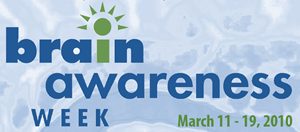 |
| Brain Awareness Week runs until March 19. |
Being in the presence of someone having a seizure can be an unsettling experience for an observer seeing it for the first time. But with thousands of Canadians affected by epilepsy, it’s not that uncommon an experience – and it’s important to know the facts.
Tonight, March 16, as part of Brain Awareness Week, Dr. Michael Esser, the William Dennis Chair in Pediatric Epilepsy Research, will be presenting a public lecture on “Epilepsy – Facts, Fiction and Reality” in the Potter Auditorium of the Rowe Building at 7 p.m. And sadly, he says, there are a lot of fictions out there.
For instance, have you heard that someone can swallow their tongue while in the midst of seizure? Not true – it’s physiologically impossible to do so. And that you should put an object or your fingers in the mouth of someone suffering from a seizure? That’s downright dangerous to everyone involved.
But that pales in comparison to attitudes in the developing world, where over 80 per cent of global epilepsy cases occur. There, people who suffer from epilepsy can often be seen as intellectually impaired, violent or dangerous, when they’re generally none of the sort.
“I’m hoping that people in attendance can not only gain a better awareness of the condition, but will learn to reject some of the stigmas surrounding it,” says Dr. Esser.
|
“We know some of the causes of epilepsy – things like infections, brain injuries, trauma, strokes, says Dr. Esser. “But in a large portion of cases, something like 50 or 60 per cent, we just don’t know the cause.”
He notes that Halifax is actually a hot spot for epilepsy research, with talented researchers working in clinical epidemiology, neuroimaging and neurodiagnostics and basic science research. Dr. Esser’s work falls into the overlap of the different categories, which he says is a huge asset.
“It gives me the opportunity to see the clinical condition, and then take that information and knowledge into a laboratory setting.”
